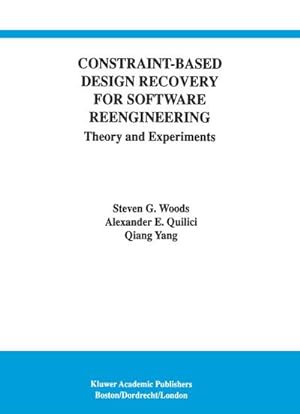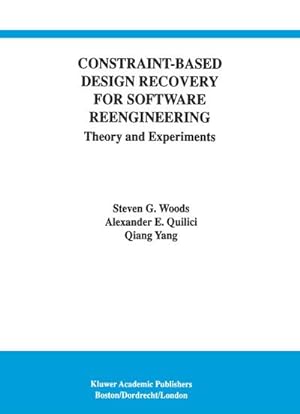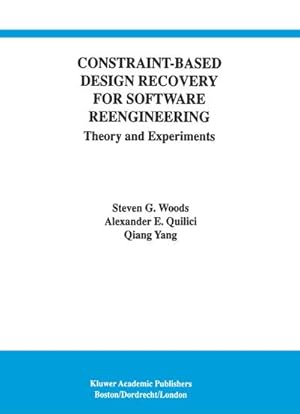constraint based design recovery software di woods steven (24 risultati)
FeedbackFiltri di ricerca
Tipo di articolo
- Tutti i tipi di prodotto
- Libri (24)
- Riviste e Giornali (Nessun altro risultato corrispondente a questo perfezionamento)
- Fumetti (Nessun altro risultato corrispondente a questo perfezionamento)
- Spartiti (Nessun altro risultato corrispondente a questo perfezionamento)
- Arte, Stampe e Poster (Nessun altro risultato corrispondente a questo perfezionamento)
- Fotografie (Nessun altro risultato corrispondente a questo perfezionamento)
- Mappe (Nessun altro risultato corrispondente a questo perfezionamento)
- Manoscritti e Collezionismo cartaceo (Nessun altro risultato corrispondente a questo perfezionamento)
Condizioni Maggiori informazioni
- Nuovo (21)
- Come nuovo, Ottimo o Quasi ottimo (3)
- Molto buono o Buono (Nessun altro risultato corrispondente a questo perfezionamento)
- Discreto o Mediocre (Nessun altro risultato corrispondente a questo perfezionamento)
- Come descritto (Nessun altro risultato corrispondente a questo perfezionamento)
Legatura
Ulteriori caratteristiche
- Prima ed. (Nessun altro risultato corrispondente a questo perfezionamento)
- Copia autograf. (Nessun altro risultato corrispondente a questo perfezionamento)
- Sovracoperta (Nessun altro risultato corrispondente a questo perfezionamento)
- Con foto (12)
- Non Print on Demand (16)
Lingua (1)
Prezzo
- Qualsiasi prezzo
- Inferiore a EUR 20 (Nessun altro risultato corrispondente a questo perfezionamento)
- EUR 20 a EUR 45 (Nessun altro risultato corrispondente a questo perfezionamento)
- Superiore a EUR 45
Spedizione gratuita
Paese del venditore
Valutazione venditore
-
Constraint-based Design Recovery For Software Reengineering
Da: Romtrade Corp., STERLING HEIGHTS, MI, U.S.A.
EUR 132,06
Convertire valutaGratis per la spedizione da U.S.A. a ItaliaQuantità: 1 disponibili
Aggiungi al carrelloCondizione: New. This is a Brand-new US Edition. This Item may be shipped from US or any other country as we have multiple locations worldwide.
-
Constraint-Based Design Recovery for Software Reengineering: Theory and Experiments (International Series in Software Engineering, 3)
Da: ALLBOOKS1, Direk, SA, Australia
EUR 155,29
Convertire valutaGratis per la spedizione da Australia a ItaliaQuantità: 1 disponibili
Aggiungi al carrelloBrand new book. Fast ship. Please provide full street address as we are not able to ship toPOboxaddress.
-
Constraint-Based Design Recovery for Software Reengineering: Theory and Experiments (International Series in Software Engineering, 3)
Da: Best Price, Torrance, CA, U.S.A.
EUR 191,79
Convertire valutaEUR 25,57 per la spedizione da U.S.A. a ItaliaQuantità: 2 disponibili
Aggiungi al carrelloCondizione: New. SUPER FAST SHIPPING.
-
Constraint-Based Design Recovery for Software Reengineering: Theory and Experiments (International Series in Software Engineering)
Da: Best Price, Torrance, CA, U.S.A.
EUR 191,79
Convertire valutaEUR 25,57 per la spedizione da U.S.A. a ItaliaQuantità: 1 disponibili
Aggiungi al carrelloCondizione: New. SUPER FAST SHIPPING.
-
Constraint-Based Design Recovery for Software Reengineering : Theory and Experiments
Da: GreatBookPrices, Columbia, MD, U.S.A.
EUR 203,42
Convertire valutaEUR 17,05 per la spedizione da U.S.A. a ItaliaQuantità: Più di 20 disponibili
Aggiungi al carrelloCondizione: New.
-
Constraint-Based Design Recovery for Software Reengineering: Theory and Experiments (International Series in Software Engineering)
Da: Ria Christie Collections, Uxbridge, Regno Unito
EUR 219,20
Convertire valutaEUR 10,39 per la spedizione da Regno Unito a ItaliaQuantità: Più di 20 disponibili
Aggiungi al carrelloCondizione: New. In.
-
Constraint-Based Design Recovery for Software Reengineering : Theory and Experiments
Da: GreatBookPricesUK, Woodford Green, Regno Unito
EUR 216,64
Convertire valutaEUR 17,34 per la spedizione da Regno Unito a ItaliaQuantità: Più di 20 disponibili
Aggiungi al carrelloCondizione: New.
-
Constraint-Based Design Recovery for Software Reengineering : Theory and Experiments
Editore: Springer US, Springer New York, 2012
ISBN 10: 1461374944 ISBN 13: 9781461374947
Lingua: Inglese
Da: AHA-BUCH GmbH, Einbeck, Germania
EUR 216,56
Convertire valutaEUR 14,99 per la spedizione da Germania a ItaliaQuantità: 1 disponibili
Aggiungi al carrelloTaschenbuch. Condizione: Neu. Druck auf Anfrage Neuware - Printed after ordering - The great challenge of reverse engineering is recovering design information from legacy code: the concept recovery problem. This monograph describes our research effort in attacking this problem. It discusses our theory of how a constraint-based approach to program plan recognition can efficiently extract design concepts from source code, and it details experiments in concept recovery that support our claims of scalability. Importantly, we present our models and experiments in sufficient detail so that they can be easily replicated. This book is intended for researchers or software developers concerned with reverse engineering or reengineering legacy systems. However, it may also interest those researchers who are interested using plan recognition techniques or constraint-based reasoning. We expect the reader to have a reasonable computer science background (i.e., familiarity with the basics of programming and algorithm analysis), but we do not require familiarity with the fields of reverse engineering or artificial intelligence (AI). To this end, we carefully explain all the AI techniques we use. This book is designed as a reference for advanced undergraduate or graduate seminar courses in software engineering, reverse engineering, or reengineering. It can also serve as a supplementary textbook for software engineering-related courses, such as those on program understanding or design recovery, for AI-related courses, such as those on plan recognition or constraint satisfaction, and for courses that cover both topics, such as those on AI applications to software engineering. ORGANIZATION The book comprises eight chapters.
-
Constraint-Based Design Recovery for Software Reengineering: Theory and Experiments (International Series in Software Engineering, 3)
Da: Ria Christie Collections, Uxbridge, Regno Unito
EUR 227,65
Convertire valutaEUR 10,39 per la spedizione da Regno Unito a ItaliaQuantità: Più di 20 disponibili
Aggiungi al carrelloCondizione: New. In.
-
Constraint-Based Design Recovery for Software Reengineering : Theory and Experiments
Da: AHA-BUCH GmbH, Einbeck, Germania
EUR 223,11
Convertire valutaEUR 14,99 per la spedizione da Germania a ItaliaQuantità: 1 disponibili
Aggiungi al carrelloBuch. Condizione: Neu. Druck auf Anfrage Neuware - Printed after ordering - The great challenge of reverse engineering is recovering design information from legacy code: the concept recovery problem. This monograph describes our research effort in attacking this problem. It discusses our theory of how a constraint-based approach to program plan recognition can efficiently extract design concepts from source code, and it details experiments in concept recovery that support our claims of scalability. Importantly, we present our models and experiments in sufficient detail so that they can be easily replicated. This book is intended for researchers or software developers concerned with reverse engineering or reengineering legacy systems. However, it may also interest those researchers who are interested using plan recognition techniques or constraint-based reasoning. We expect the reader to have a reasonable computer science background (i.e., familiarity with the basics of programming and algorithm analysis), but we do not require familiarity with the fields of reverse engineering or artificial intelligence (AI). To this end, we carefully explain all the AI techniques we use. This book is designed as a reference for advanced undergraduate or graduate seminar courses in software engineering, reverse engineering, or reengineering. It can also serve as a supplementary textbook for software engineering-related courses, such as those on program understanding or design recovery, for AI-related courses, such as those on plan recognition or constraint satisfaction, and for courses that cover both topics, such as those on AI applications to software engineering. ORGANIZATION The book comprises eight chapters.
-
Constraint-Based Design Recovery for Software Reengineering : Theory and Experiments
Da: GreatBookPrices, Columbia, MD, U.S.A.
EUR 239,29
Convertire valutaEUR 17,05 per la spedizione da U.S.A. a ItaliaQuantità: Più di 20 disponibili
Aggiungi al carrelloCondizione: As New. Unread book in perfect condition.
-
Constraint-Based Design Recovery for Software Reengineering : Theory and Experiments
Da: GreatBookPricesUK, Woodford Green, Regno Unito
EUR 245,06
Convertire valutaEUR 17,34 per la spedizione da Regno Unito a ItaliaQuantità: Più di 20 disponibili
Aggiungi al carrelloCondizione: As New. Unread book in perfect condition.
-
Constraint-Based Design Recovery for Software Reengineering: Theory and Experiments (International Series in Software Engineering)
Da: Lucky's Textbooks, Dallas, TX, U.S.A.
EUR 201,91
Convertire valutaEUR 63,96 per la spedizione da U.S.A. a ItaliaQuantità: Più di 20 disponibili
Aggiungi al carrelloCondizione: New.
-
Constraint-Based Design Recovery for Software Reengineering: Theory and Experiments (International Series in Software Engineering, 3)
Da: Lucky's Textbooks, Dallas, TX, U.S.A.
EUR 202,24
Convertire valutaEUR 63,96 per la spedizione da U.S.A. a ItaliaQuantità: Più di 20 disponibili
Aggiungi al carrelloCondizione: New.
-
EUR 277,02
Convertire valutaEUR 7,68 per la spedizione da U.S.A. a ItaliaQuantità: 4 disponibili
Aggiungi al carrelloCondizione: New. pp. 216 Index.
-
Constraint-Based Design Recovery for Software Reengineering: Theory and Experiments (International Series in Software Engineering, 3)
Da: Mispah books, Redhill, SURRE, Regno Unito
EUR 308,33
Convertire valutaEUR 28,90 per la spedizione da Regno Unito a ItaliaQuantità: 1 disponibili
Aggiungi al carrelloPaperback. Condizione: Like New. Like New. book.
-
Constraint-Based Design Recovery for Software Reengineering
Da: moluna, Greven, Germania
EUR 180,07
Convertire valutaEUR 9,70 per la spedizione da Germania a ItaliaQuantità: Più di 20 disponibili
Aggiungi al carrelloCondizione: New. Dieser Artikel ist ein Print on Demand Artikel und wird nach Ihrer Bestellung fuer Sie gedruckt. The great challenge of reverse engineering is recovering design information from legacy code: the concept recovery problem. This monograph describes our research effort in attacking this problem. It discusses our theory of how a constraint-based approach to.
-
Constraint-Based Design Recovery for Software Reengineering
Da: moluna, Greven, Germania
EUR 180,07
Convertire valutaEUR 9,70 per la spedizione da Germania a ItaliaQuantità: Più di 20 disponibili
Aggiungi al carrelloGebunden. Condizione: New. Dieser Artikel ist ein Print on Demand Artikel und wird nach Ihrer Bestellung fuer Sie gedruckt. The great challenge of reverse engineering is recovering design information from legacy code: the concept recovery problem. This monograph describes our research effort in attacking this problem. It discusses our theory of how a constraint-based approach to.
-
Constraint-Based Design Recovery for Software Reengineering
Da: BuchWeltWeit Ludwig Meier e.K., Bergisch Gladbach, Germania
EUR 213,99
Convertire valutaEUR 11,00 per la spedizione da Germania a ItaliaQuantità: 2 disponibili
Aggiungi al carrelloTaschenbuch. Condizione: Neu. This item is printed on demand - it takes 3-4 days longer - Neuware -The great challenge of reverse engineering is recovering design information from legacy code: the concept recovery problem. This monograph describes our research effort in attacking this problem. It discusses our theory of how a constraint-based approach to program plan recognition can efficiently extract design concepts from source code, and it details experiments in concept recovery that support our claims of scalability. Importantly, we present our models and experiments in sufficient detail so that they can be easily replicated. This book is intended for researchers or software developers concerned with reverse engineering or reengineering legacy systems. However, it may also interest those researchers who are interested using plan recognition techniques or constraint-based reasoning. We expect the reader to have a reasonable computer science background (i.e., familiarity with the basics of programming and algorithm analysis), but we do not require familiarity with the fields of reverse engineering or artificial intelligence (AI). To this end, we carefully explain all the AI techniques we use. This book is designed as a reference for advanced undergraduate or graduate seminar courses in software engineering, reverse engineering, or reengineering. It can also serve as a supplementary textbook for software engineering-related courses, such as those on program understanding or design recovery, for AI-related courses, such as those on plan recognition or constraint satisfaction, and for courses that cover both topics, such as those on AI applications to software engineering. ORGANIZATION The book comprises eight chapters. 216 pp. Englisch.
-
Constraint-Based Design Recovery for Software Reengineering
Editore: Springer US, Springer New York Nov 1997, 1997
ISBN 10: 0792380673 ISBN 13: 9780792380672
Lingua: Inglese
Da: buchversandmimpf2000, Emtmannsberg, BAYE, Germania
EUR 213,99
Convertire valutaEUR 15,00 per la spedizione da Germania a ItaliaQuantità: 1 disponibili
Aggiungi al carrelloBuch. Condizione: Neu. This item is printed on demand - Print on Demand Titel. Neuware -The great challenge of reverse engineering is recovering design information from legacy code: the concept recovery problem. This monograph describes our research effort in attacking this problem. It discusses our theory of how a constraint-based approach to program plan recognition can efficiently extract design concepts from source code, and it details experiments in concept recovery that support our claims of scalability. Importantly, we present our models and experiments in sufficient detail so that they can be easily replicated. This book is intended for researchers or software developers concerned with reverse engineering or reengineering legacy systems. However, it may also interest those researchers who are interested using plan recognition techniques or constraint-based reasoning. We expect the reader to have a reasonable computer science background (i.e., familiarity with the basics of programming and algorithm analysis), but we do not require familiarity with the fields of reverse engineering or artificial intelligence (AI). To this end, we carefully explain all the AI techniques we use. This book is designed as a reference for advanced undergraduate or graduate seminar courses in software engineering, reverse engineering, or reengineering. It can also serve as a supplementary textbook for software engineering-related courses, such as those on program understanding or design recovery, for AI-related courses, such as those on plan recognition or constraint satisfaction, and for courses that cover both topics, such as those on AI applications to software engineering. ORGANIZATION The book comprises eight chapters.Springer Verlag GmbH, Tiergartenstr. 17, 69121 Heidelberg 216 pp. Englisch.
-
Constraint-Based Design Recovery for Software Reengineering
Editore: Springer US, Springer New York Okt 2012, 2012
ISBN 10: 1461374944 ISBN 13: 9781461374947
Lingua: Inglese
Da: buchversandmimpf2000, Emtmannsberg, BAYE, Germania
EUR 213,99
Convertire valutaEUR 15,00 per la spedizione da Germania a ItaliaQuantità: 1 disponibili
Aggiungi al carrelloTaschenbuch. Condizione: Neu. This item is printed on demand - Print on Demand Titel. Neuware -The great challenge of reverse engineering is recovering design information from legacy code: the concept recovery problem. This monograph describes our research effort in attacking this problem. It discusses our theory of how a constraint-based approach to program plan recognition can efficiently extract design concepts from source code, and it details experiments in concept recovery that support our claims of scalability. Importantly, we present our models and experiments in sufficient detail so that they can be easily replicated. This book is intended for researchers or software developers concerned with reverse engineering or reengineering legacy systems. However, it may also interest those researchers who are interested using plan recognition techniques or constraint-based reasoning. We expect the reader to have a reasonable computer science background (i.e., familiarity with the basics of programming and algorithm analysis), but we do not require familiarity with the fields of reverse engineering or artificial intelligence (AI). To this end, we carefully explain all the AI techniques we use. This book is designed as a reference for advanced undergraduate or graduate seminar courses in software engineering, reverse engineering, or reengineering. It can also serve as a supplementary textbook for software engineering-related courses, such as those on program understanding or design recovery, for AI-related courses, such as those on plan recognition or constraint satisfaction, and for courses that cover both topics, such as those on AI applications to software engineering. ORGANIZATION The book comprises eight chapters.Springer Verlag GmbH, Tiergartenstr. 17, 69121 Heidelberg 216 pp. Englisch.
-
Constraint-Based Design Recovery for Software Reengineering
Da: BuchWeltWeit Ludwig Meier e.K., Bergisch Gladbach, Germania
EUR 234,33
Convertire valutaEUR 11,00 per la spedizione da Germania a ItaliaQuantità: 2 disponibili
Aggiungi al carrelloBuch. Condizione: Neu. This item is printed on demand - it takes 3-4 days longer - Neuware -The great challenge of reverse engineering is recovering design information from legacy code: the concept recovery problem. This monograph describes our research effort in attacking this problem. It discusses our theory of how a constraint-based approach to program plan recognition can efficiently extract design concepts from source code, and it details experiments in concept recovery that support our claims of scalability. Importantly, we present our models and experiments in sufficient detail so that they can be easily replicated. This book is intended for researchers or software developers concerned with reverse engineering or reengineering legacy systems. However, it may also interest those researchers who are interested using plan recognition techniques or constraint-based reasoning. We expect the reader to have a reasonable computer science background (i.e., familiarity with the basics of programming and algorithm analysis), but we do not require familiarity with the fields of reverse engineering or artificial intelligence (AI). To this end, we carefully explain all the AI techniques we use. This book is designed as a reference for advanced undergraduate or graduate seminar courses in software engineering, reverse engineering, or reengineering. It can also serve as a supplementary textbook for software engineering-related courses, such as those on program understanding or design recovery, for AI-related courses, such as those on plan recognition or constraint satisfaction, and for courses that cover both topics, such as those on AI applications to software engineering. ORGANIZATION The book comprises eight chapters. 220 pp. Englisch.
-
Constraint-Based Design Recovery for Software Reengineering
Da: Majestic Books, Hounslow, Regno Unito
EUR 293,05
Convertire valutaEUR 10,23 per la spedizione da Regno Unito a ItaliaQuantità: 4 disponibili
Aggiungi al carrelloCondizione: New. Print on Demand pp. 216 Figure, 49:B&W 6.14 x 9.21 in or 234 x 156 mm (Royal 8vo) Perfect Bound on White w/Gloss Lam.
-
Constraint-Based Design Recovery for Software Reengineering
Da: Biblios, Frankfurt am main, HESSE, Germania
EUR 300,33
Convertire valutaEUR 7,95 per la spedizione da Germania a ItaliaQuantità: 4 disponibili
Aggiungi al carrelloCondizione: New. PRINT ON DEMAND pp. 216.















